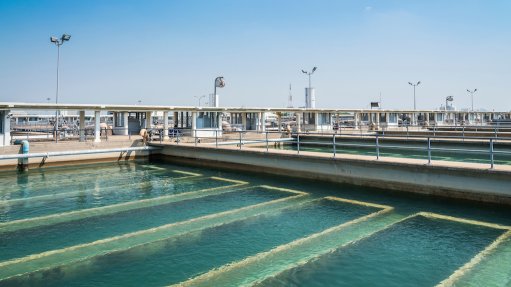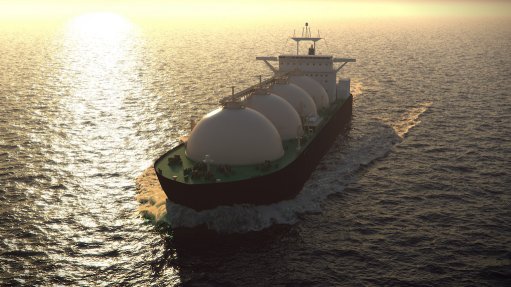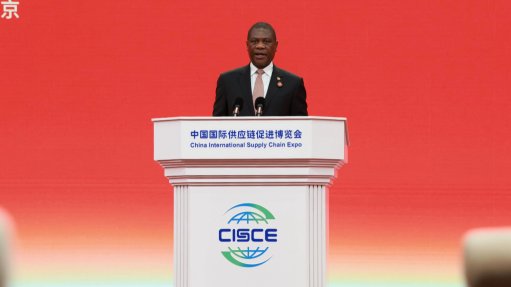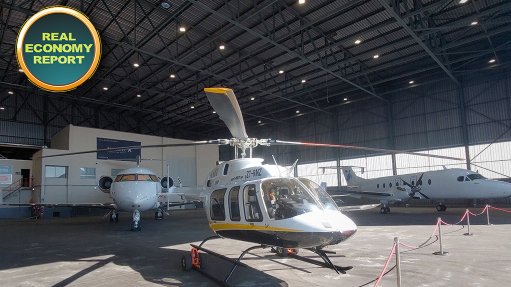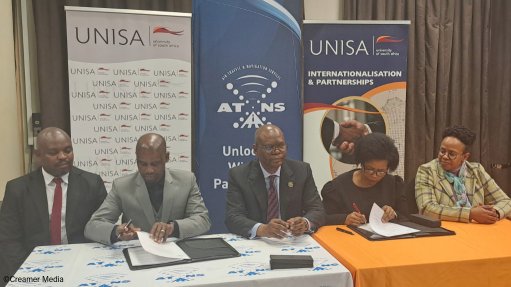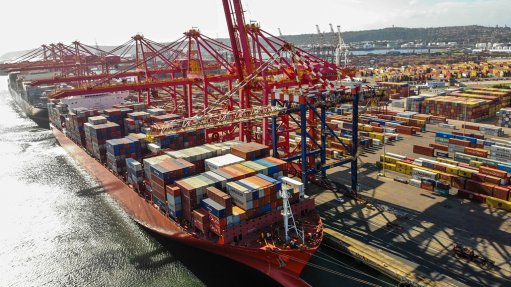Pan African reconfigures mines to address production slip; focusses on solar PV

Pan African reaffirms full-year guidance, commits further to renewables. Video and Editing: Shadwyn Dickinson
JSE- and LSE-listed midtier gold producer Pan African Resources produced 92 307 oz of gold for the six months to December 31, 2022 – down 14.6% year-on-year, following the record gold production achieved in the six months to December 31, 2021.
It does, however, expect production to increase in the second half of its 2023 financial year, which ends on June 30, owing to Barberton mines’ continuous operating cycle and other enhancement initiatives being implemented.
The producer intends to maintain its full-year production guidance at between 195 000 oz and 205 000 oz, subject to consistency in Eskom’s electricity supply.
CEO Cobus Loots says reduced gold production over the past six months under review is primarily attributed to the performance of Barberton mines’ underground operations.
The decrease in production, mainly attributable to Barberton mines’ underground operations, will be addressed by reconfiguring Fairview and Sheba mines’ shift cycles to continuous (24-hour) operations and converting the Consort mine to a contract mining model.
The contract mining model at Consort is focused on reducing overheads and mining higher grade areas. Going forward, Loots says, the breakeven gold production at Consort will be less than 30 kg a month of gold and that Pan African will continue exploration and development of new mining areas at the mine.
“The contractor should be fully ramped up by April.
“Excess Consort staff have been moved to Fairview and Sheba to supplement our existing staff complement for continuous operations.
“Shifts have been extended from eight hours to ten . . . We are transitioning to two blasts a day in higher-grading and development areas in the next month,” says Loots.
He adds that the ability to mine more times and do more development will also impact the cut-off grade, meaning that lower-grade orebodies now become available for mining.
These restructuring plans, together with other initiatives to increase mining flexibility, will ensure the sustainability of these operations in the future.
“We believe that the tangible measures being implemented at these operations will result in a significant improvement in production during the second half of the financial year and in the years ahead,” says Loots.
He notes, however, that the balance of the group’s portfolio delivered in line with expectations, despite disruptions to electricity supply and inclement weather conditions adversely impacting operations.
Gold production from Elikhulu is expected to increase marginally in the second half of the 2023 financial year, as material from the Leslie/Bracken tailings storage facility (TSF) is retreated, following the installation of the 6 km pipeline and successful commissioning of its pump station in September 2022.
Evander mines’ underground production decreased by 29.8% in the period to 19 173 oz, despite an increase in processed tonnes by 6% to 73 946 t as a result of the normalisation of mining face grades in line with planned grades and limited mining rates in accordance with geotechnical parameters for the shaft pillar’s safe extraction.
“At our Evander mines alone, electricity issues adversely impacted production by [about] 5%, reinforcing our strategic objective to expand our renewable energy portfolio in the years ahead,” says Loots.
In terms of financial performance, Pan African’s all-inclusive sustaining costs (AISC) increased by 10.1% year-on-year to $1 291/oz.
However, Pan African points out that its operations, which account for over 85% of the group’s total production, achieved an AISC of $1 139/oz, resulting in an AISC margin of 34% on the average gold price of $1 725/oz earned by the group during the period under review.
Further, Pan African notes that, post the reporting period, spot gold prices have increased. The miner says that if this increase is maintained further benefits to operational margins in the second half of the financial year are likely to be realised.
Profit after tax for the interim reporting period was $28.9-million, identical to the $28.9-million profit generated during the second half of the 2022 financial year, but 45.9% down year-on-year.
SOLAR EMPOWERED
Pan African reports that it is embarking on a number of restructuring initiatives to reduce its production cost in real terms. These, combined with the electricity cost savings from large-scale solar photovoltaic (PV) renewable energy projects and anticipated increased production during the remainder of the 2023 financial year, are expected to contribute to reducing unit production costs in the future.
“We continue to reduce our reliance on Eskom . . . The group is planning to have at least 30 MW of our own generating capacity in the next 24 months.
“We have also invested in additional diesel generating capacity to cater for longer periods without Eskom power at our underground operations,” he says.
Savings at Evander mines’ 10 MW solar PV renewable energy plant currently average about $145 000 a month following its full commissioning in May 2022.
This project, the miner highlights, convincingly demonstrates the business case for renewable energy in the South African mining industry and serves to maintain Pan African’s strategic objective to expand this footprint significantly in the coming years.
Pan African also plans to expand its solar PV integration at Evander to subsidise the underground operation with a plant of between 12 MW and 15 MW; while also having plans to break ground on an 8.5 MW solar PV plant at its Barberton operations before the end of June and have it steady-state and producing early in 2024.
In total, Pan African’s solar PV ambitions come with a payback period of between about four and five years, based on expected electricity price escalations.
The already-commissioned solar PV plant is realising savings of between R2.5-million and R4-million a month, Loots tells Mining Weekly.
Further, in addition to solar PV, he says, Pan African is investigating a number of other alternatives.
“There is no one silver bullet to the issue that we are facing in terms of Eskom. And that is why we are not putting all of our eggs in one basket. I think, hopefully, we would be able to make some additional announcements soon in terms of further expanding the renewables footprint,” says Loots.
Meanwhile, the Barberton tailings retreatment plant produced 9.2% more year-on-year with 10 012 oz at an AISC of $725/oz, down from the $814/oz of the six months to December 31, 2021.
Gold production from Elikhulu, also one of the lowest-cost gold mining operations in Southern Africa, remained steady at 25 830 oz, at an AISC of $947/oz, despite electricity supply disruptions and inclement weather conditions during the November and December rainy season.
Further, Pan African reports that it is progressing with group-wide growth projects, including the development of the 24, 25 and 26 Level project at Evander mines, which is on track, with equipping of the existing ventilation shaft from 17 to 24 Levels underway. Loots says Levels 25 and 26 are effectively a new mine development.
Hoisting of ore through this vertical shaft will significantly streamline ore handling and reduce dependency on the current conveyor belt system.
Following the positive definitive feasibility study results for the remining of Mogale Gold TSFs, the group is completing enhancement and value engineering activities in preparation for the construction of the tailings retreatment plant (the Mintails project), which is expected to commence by June.
Concept engineering works for the Soweto cluster’s TSFs are also underway – an operation expected to increase current group gold production by up to 25%, or 50 000 oz/y.
Also, processing of a 10 000 t bulk sample from the Royal Sheba project at the Sheba and Consort metallurgical plants was completed, with recoveries in line with expectations. Recovered grades were 1.22 g/t in excess of the planned grade of 0.5 g/t.
Comments
Press Office
Announcements
What's On
Subscribe to improve your user experience...
Option 1 (equivalent of R125 a month):
Receive a weekly copy of Creamer Media's Engineering News & Mining Weekly magazine
(print copy for those in South Africa and e-magazine for those outside of South Africa)
Receive daily email newsletters
Access to full search results
Access archive of magazine back copies
Access to Projects in Progress
Access to ONE Research Report of your choice in PDF format
Option 2 (equivalent of R375 a month):
All benefits from Option 1
PLUS
Access to Creamer Media's Research Channel Africa for ALL Research Reports, in PDF format, on various industrial and mining sectors
including Electricity; Water; Energy Transition; Hydrogen; Roads, Rail and Ports; Coal; Gold; Platinum; Battery Metals; etc.
Already a subscriber?
Forgotten your password?
Receive weekly copy of Creamer Media's Engineering News & Mining Weekly magazine (print copy for those in South Africa and e-magazine for those outside of South Africa)
➕
Recieve daily email newsletters
➕
Access to full search results
➕
Access archive of magazine back copies
➕
Access to Projects in Progress
➕
Access to ONE Research Report of your choice in PDF format
RESEARCH CHANNEL AFRICA
R4500 (equivalent of R375 a month)
SUBSCRIBEAll benefits from Option 1
➕
Access to Creamer Media's Research Channel Africa for ALL Research Reports on various industrial and mining sectors, in PDF format, including on:
Electricity
➕
Water
➕
Energy Transition
➕
Hydrogen
➕
Roads, Rail and Ports
➕
Coal
➕
Gold
➕
Platinum
➕
Battery Metals
➕
etc.
Receive all benefits from Option 1 or Option 2 delivered to numerous people at your company
➕
Multiple User names and Passwords for simultaneous log-ins
➕
Intranet integration access to all in your organisation







